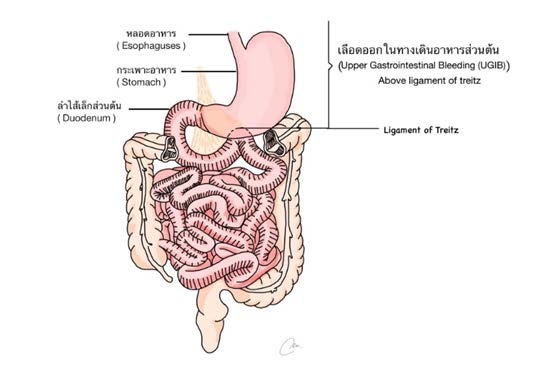Roles of Nurses in Prevention and Management of Gastrointestinal Bleeding
Main Article Content
Abstract
Gastrointestinal bleeding, a symptom of digestive system disorder, is a common emergency condition in intensive care units. Complications of gastrointestinal bleeding may result in patients experiencing excessive hemorrhage – major blood loss which potentially leading to death (exsanguination). Some patients may require longer length of stay and recovery in hospital, in accompanied with higher cost of treatment. Gastrointestinal bleeding can also become a chronic illness that causes patients to be hospitalized repeatedly. Nurses as a principal group of medical practitioners play an important role in delivering symptom preventions and primary care. To ensure that nurses are adequately equipped to treat gastrointestinal bleeding, fundamental knowledge of the symptom is indispensable (i.e., definition of gastrointestinal bleeding, characterization of pathological differences, assessment of severity and pathophysiology of gastrointestinal bleeding). In addition, standard educational guidelines as a tool should be developed for clinical practice. Some of the purposes of the guidelines include, but not limited to, monitoring complications, preparing patients for special examinations, pre and post examination care, as well as to prevention of recurrence of bleeding. Consequently, nurses’ capability in providing an effective quality care with accuracy, promptness and competence contribute significantly to successful intervention, patient safety and improvement of mortality.
Article Details

This work is licensed under a Creative Commons Attribution-NonCommercial-NoDerivatives 4.0 International License.
References
Zheng NS, Tsay C, Shung D, Laine L. Trends in characteristics, management, and outcomes of patients presenting with gastrointestinal bleeding to emergency departments in the United States from 2006 to 2019. Aliment Pharmacol Ther. 2022;56(11-12):1543-55.
Kamboj AK, Hoversten P, Leggett CL. Upper Gastrointestinal Bleeding: Etiologies and Management. Mayo Clin Proc. 2019;94(4):697-703.
Feinman M, Haut ER. Upper gastrointestinal bleeding. Surg Clin North Am. 2014;94(1):43-53.
Edelman DA, Sugawa C. Lower gastrointestinal bleeding: a review. Surg Endosc. 2007;21(4):514-20.
Costable NJ, Greenwald DA. Upper Gastrointestinal Bleeding. Clin Geriatr Med. 2021;37(1):155-72.
Oakland K. Changing epidemiology and etiology of upper and lower gastrointestinal bleeding. Best Pract Res Clin Gastroenterol. 2019;42-43:101610.
Tokar JL, Higa JT. Acute Gastrointestinal Bleeding. Ann Intern Med. 2022;175(2):ITC17-ITC32.
Kim JS, Kim BW, Kim DH, Park CH, Lee H, Joo MK, et al. Guidelines for Non-variceal Upper Gastrointestinal Bleeding. Korean J Gastroenterol. 2020;75(6):322-32.
Wilkins T, Wheeler B, Carpenter M. Upper Gastrointestinal Bleeding in Adults: Evaluation and Management. Am Fam Physician. 2020;101(5):294-300.
Whitehurst BD. Lower Gastrointestinal Bleeding. Surg Clin North Am. 2018;98(5):1059-72.
Barkun AN, Almadi M, Kuipers EJ, Laine L, Sung J, Tse F, et al. Management of Nonvariceal Upper Gastrointestinal Bleeding: Guideline Recommendations from the International Consensus Group. Ann Intern Med. 2019 ;171(11):805-22.
Kamboj AK, Hoversten P, Leggett CL. Upper Gastrointestinal Bleeding: Etiologies and Management. Mayo Clin Proc. 2019;94(4):697-703.
Rex DK, Schoenfeld PS, Cohen J, Pike IM, Adler DG, Fennerty MB, et al. Quality indicators for colonoscopy. Gastrointest Endosc 2015;81(1):31-53.
Strate LL, Syngal S. Timing of colonoscopy: impact on length of hospital stay in patients with acute lower intestinal bleeding. Am J Gastroenterol 2003;98(2):317-22.
Gady JS, Reynolds H, Blum A. Selective arterial embolization for control of lower gastrointestinal bleeding: recommendations for a clinical management pathway. Curr Surg. 2003;60(3):344-7.
Loffroy R, Rao P, Ota S, Lin MD, Kwak BK, Geschwind JF. Embolization of acute nonvariceal upper gastrointestinal hemorrhage resistant to endoscopic treatment: results and predictors of recurrent bleeding. Cardiovasc Intervent Radiol 2010;33(6):1088-100.
Gerson L, Kamal A. Cost-effectiveness analysis of management strategies for obscure GI bleeding. Gastrointest Endosc 2008;68(5):920-36.
Gillespie CJ, Sutherland AD, Mossop PJ, Woods RJ, Keck JO, Heriot AG. Mesenteric embolization for lower gastrointestinal bleeding. Dis Colon Rectum 2010;53(9):1258-64.






